From mirror.co.uk:
Nearly half of the baby food we give children contains toxic pesticides which can harm their development, a study shows. This is “concerning” for babies who are “particularly vulnerable”, says the author.
Almost 40% of conventional baby food products analysed in a US study contained toxic pesticides, it has emerged.
None of the organic products which were sampled in the survey conducted by the non-profit Environmental Working Group (EWG) contained pesticides. The research surveyed 73 products with at least one pesticide in 22 of them – and many showing more than one.
The substances can pose a particular health risk to babies and young children, who are “particularly vulnerable” to their damaging effects according to senior science analyst at EWG and report co-author Sydney Evans. She described any “pesticide residue” in baby food as “concerning”.
Looking at products from Beech-Nut, Gerber and Parent’s Choice, the study detected acetamiprid, a neonicotinoid insecticide harmful to bees and humans, and captan, often linked to cancer. Five of the products contained fludioxonil, a product which harms foetal development, affects the immune system and disrupts hormones – and is commonly used on fruits, vegetables and cereals.
Apple-based products were those most likely to contain high pesticide residue, with pears, blueberries and strawberries also typically holding high levels of the chemicals. Some of the pesticides are also linked to damage to the nervous and reproductive system.
The study suggested that buying organic baby food products is the best way to avoid feeding your child with foods high in toxic pesticides. Study co-author Olga Naidenko said organic baby foods are subject to much stricter regulations – and the gap in price between the two has reduced, according to the Guardian.
Despite this, EWG found that pesticide levels in baby foods are generally decreasing. Comparing its findings to a study from 1995, EWG found that 15 percent less baby foods contain dangerous pesticides than did 28 years ago, when around 55 percent of the products tested contained the chemicals.
This can partly be credited to the Food Quality Protection Act 1996 which required a “reasonable certainty” that pesticide residues in baby food would not harm infants. Certain pesticides are no longer found, including chlorpyrifos – which was banned for use in food in 2021.
Evans believes this was due to widespread pressure. “Advocacy works,” she said. “Any pesticide residue in baby food is concerning, but parents should feel reassured that some of the most toxic chemicals we found in our 1995 study are no longer being detected.”
Naidenko noted that any level of pesticide is still a concern – and attempting to ban chemicals usually means a difficult and drawn out court battle, while the manufacturers and public health advocates put out contradicting information. “At some level the public doesn’t care, it just says, ‘We don’t want these pesticides in baby food,’” Naidenko said.
Disclaimer: We at Prepare for Change (PFC) bring you information that is not offered by the mainstream news, and therefore may seem controversial. The opinions, views, statements, and/or information we present are not necessarily promoted, endorsed, espoused, or agreed to by Prepare for Change, its leadership Council, members, those who work with PFC, or those who read its content. However, they are hopefully provocative. Please use discernment! Use logical thinking, your own intuition and your own connection with Source, Spirit and Natural Laws to help you determine what is true and what is not. By sharing information and seeding dialogue, it is our goal to raise consciousness and awareness of higher truths to free us from enslavement of the matrix in this material realm.
 EN
EN FR
FR


























